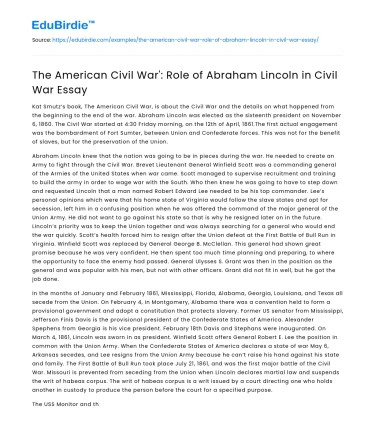Introduction
The American Civil War, a pivotal conflict that raged from 1861 to 1865, was a defining moment in United States history. It was a battle not only for the preservation of the Union but also for the abolition of slavery. At the heart of this tumultuous period was Abraham Lincoln, the 16th President of the United States, whose leadership and vision were instrumental in steering the nation through its darkest hours. Lincoln's role in the Civil War extended beyond his capacity as a wartime leader; it encompassed his moral stance on slavery, his strategic military decisions, and his efforts to maintain national unity. His leadership was characterized by resilience and a steadfast commitment to the principles upon which the nation was founded. This essay will explore Lincoln's multifaceted role in the Civil War, highlighting his influence on the course of the war and the legacy he left behind.
Leadership and Military Strategy
Abraham Lincoln's leadership during the Civil War was marked by his adept handling of military strategy and his appointment of key military leaders. Despite having no formal military training, Lincoln immersed himself in military tactics, demonstrating a remarkable capacity to learn and adapt. One of his most significant contributions was his appointment of Ulysses S. Grant as the commanding general of the Union Army. Unlike previous generals, Grant shared Lincoln’s vision of total war and was relentless in his pursuit of victory. Lincoln’s decision to persist with Grant despite the high casualties in battles like Shiloh and the Overland Campaign was pivotal, as Grant’s strategies eventually led to the Union's victory.
Save your time!
We can take care of your essay
- Proper editing and formatting
- Free revision, title page, and bibliography
- Flexible prices and money-back guarantee
Lincoln’s leadership extended to his role as a communicator and motivator. His eloquent speeches, most notably the Gettysburg Address, served to inspire both the troops and the public. In this brief but profound address, Lincoln reiterated the principles of liberty and equality, framing the war as a means to uphold these ideals. His use of rhetoric not only bolstered morale but also redefined the war’s purpose, shifting it from a fight for union to a crusade for emancipation. Lincoln’s ability to articulate a clear and compelling vision for the nation was a cornerstone of his leadership, ensuring continued support for the war effort despite mounting challenges.
Abolition of Slavery
At the core of Lincoln's presidency during the Civil War was his unwavering commitment to the abolition of slavery. Initially, Lincoln's primary objective was the preservation of the Union, but as the war progressed, the moral imperative to end slavery became increasingly central to his administration. The Emancipation Proclamation, issued on January 1, 1863, was a watershed moment in American history. Although it did not immediately free all slaves, it fundamentally altered the character of the war by making the abolition of slavery a Union war aim.
The proclamation also had significant international implications. By framing the conflict as a fight against slavery, Lincoln effectively deterred European powers, particularly Britain and France, from recognizing or supporting the Confederacy. This strategic move underscored Lincoln’s astute understanding of international diplomacy and his ability to leverage moral principles for political gain. Despite criticism from radical abolitionists who argued that the proclamation did not go far enough, Lincoln’s incremental approach to emancipation was a pragmatic strategy that balanced the complexities of wartime politics with his moral convictions.
Maintaining National Unity
Lincoln's efforts to maintain national unity during the Civil War were as crucial as his military strategies and emancipation efforts. Faced with a nation divided not only along geographical lines but also within the Union itself, Lincoln's political acumen was put to the test. His adept handling of the border states, which were slave-holding but did not secede, was vital in preventing further fragmentation of the Union. By employing a combination of political persuasion and military presence, Lincoln managed to keep these states aligned with the Union cause, thereby preserving critical resources and strategic advantages.
Moreover, Lincoln's dedication to unity was evident in his post-war vision for reconciliation. In his second inaugural address, delivered in March 1865, Lincoln articulated a vision of healing and reconstruction, urging "malice toward none" and "charity for all." This forward-looking approach was intended to pave the way for a reintegrated nation, although his assassination shortly thereafter meant he could not oversee the Reconstruction process. Nevertheless, his commitment to unity and reconciliation laid the groundwork for the eventual reunification of the United States.
Conclusion
Abraham Lincoln's role in the American Civil War was multifaceted and profound, encompassing military leadership, moral advocacy, and a dedication to national unity. His strategic decisions and moral vision not only shaped the outcome of the war but also redefined the nation's trajectory. While his leadership was not without controversy or criticism, Lincoln's ability to navigate the complexities of civil war with resilience and determination remains a testament to his enduring legacy. By the end of the conflict, the Union was preserved, and the institution of slavery was abolished, fundamentally transforming the United States. Lincoln's influence during this critical period continues to be a subject of enduring study and admiration, underscoring his pivotal role in shaping the course of American history.






 Stuck on your essay?
Stuck on your essay?

